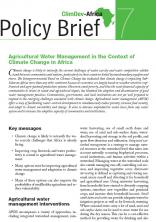Policy Brief 7 : Agricultural Water Management in the Context of Climate Change in Africa

Climate change is likely to intensify the current challenges of water scarcity and water competition within and between communities and nations, particularly in those countries linked by transboundary aquifers and rivers. The Intergovernmental Panel on Climate Change has indicated that climate change is impacting Sub-Saharan Africa more than any other continent because its economies are largely based on weather sensitive croplivestock and agro-pastoral production systems. However, rural poverty, and thus the weak financial capacity of communities to invest in water and agricultural inputs, has hindered the adoption and dissemination of good water management practices. Communities, governments, and local institutions are not yet well prepared to respond to the emerging challenges associated with climate change. Agricultural water management (AWM) offers a way of facilitating water-centred development to simultaneously reduce poverty, increase food security, and adapt to climate variability and change. It aims to decrease unproductive water losses from any water system and to increase the adaptive capacity of communities and institutions.